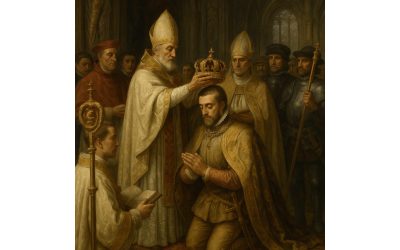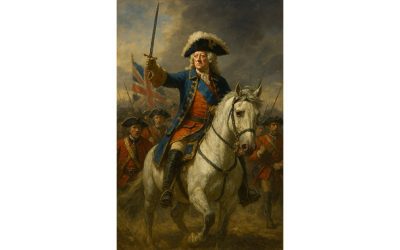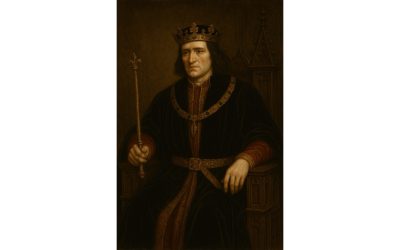The Globe Theatre
On the 29th of June, 1613, the Globe Theatre in London burnt to the ground. The Globe Theatre in London stands as an enduring symbol of Elizabethan drama and the vibrant theatrical culture of the late 16th and early 17th centuries. Originally constructed in 1599 by...
Charles V – Holy Roman Emperor
On the 28th of June, 1519, Charles V was elected Holy Roman Emperor. Sir Anthony Standen was chased out of Flanders by Don Juan, Duke of Austria, when Standen was discovered to be having an affair with Barbara Von Blomberg, the duke’s mother and once mistress of...
Battle of Dettingen
On the 27th of June, 1743, King George II became the last reigning British monarch to participate in a battle, (well so far, anyway). King George II, donned in the martial garments befitting a sovereign, commanded his forces during the War of the Austrian Succession,...
Richard III
On the 26th of June, 1483, Richard III became King of England. Richard III, the last Plantagenet King of England, remains one of the most controversial figures in British history. Born on the 2nd of October, 1452, his reign from 1483 until his death at the Battle of...
Korean War
The Korean War began on the 25th of June, 1950, when North Korean forces, backed by the Soviet Union and China, crossed the 38th parallel and invaded South Korea. This marked the beginning of a brutal conflict that lasted until the 27th of July, 1953, leaving deep...
St. Vitus’ Dance
On the 24th of June, 1374, an outbreak of St. John’s Dance, or St. Vitus’ Dance, occurred in Aachen. People began to hallucinate then jump and twitch uncontrolably until the collapsed from exhaustion. Since a physician, Manuel Nuñez, appeared in Called to Account, the...
Bannockburn
On the 23rd of June, 1314, the Battle of Bannockburn began. The Battle of Bannockburn, fought over two tumultuous days, remains one of the most significant and celebrated events in Scottish history. A pivotal clash during the First War of Scottish Independence, this...
Barbarossa
On the 22nd of June, 1941, Nazi Germany invaded the Soviet Union in Operation Barbarossa. Named after the medieval Holy Roman Emperor Frederick Barbarossa, the operation was driven by Adolf Hitler's ideological goals and strategic objectives, fundamentally altering...
Greenland
On the 21st of June, 2009, Greenland assumed self-rule. Trump wants to annex Greenland, so let’s have a closer look at the place. Greenland, the world's largest island, sits between the Arctic and Atlantic Oceans, east of the Canadian Arctic Archipelago. Although it...
The Globe Theatre
On the 29th of June, 1613, the Globe Theatre in London burnt to the ground. The Globe Theatre in London stands as an enduring symbol of Elizabethan drama and the vibrant theatrical culture of the late 16th and early 17th centuries. Originally constructed in 1599 by...
Charles V – Holy Roman Emperor
On the 28th of June, 1519, Charles V was elected Holy Roman Emperor. Sir Anthony Standen was chased out of Flanders by Don Juan, Duke of Austria, when Standen was discovered to be having an affair with Barbara Von Blomberg, the duke’s mother and once mistress of...
Battle of Dettingen
On the 27th of June, 1743, King George II became the last reigning British monarch to participate in a battle, (well so far, anyway). King George II, donned in the martial garments befitting a sovereign, commanded his forces during the War of the Austrian Succession,...
Richard III
On the 26th of June, 1483, Richard III became King of England. Richard III, the last Plantagenet King of England, remains one of the most controversial figures in British history. Born on the 2nd of October, 1452, his reign from 1483 until his death at the Battle of...
Korean War
The Korean War began on the 25th of June, 1950, when North Korean forces, backed by the Soviet Union and China, crossed the 38th parallel and invaded South Korea. This marked the beginning of a brutal conflict that lasted until the 27th of July, 1953, leaving deep...
St. Vitus’ Dance
On the 24th of June, 1374, an outbreak of St. John’s Dance, or St. Vitus’ Dance, occurred in Aachen. People began to hallucinate then jump and twitch uncontrolably until the collapsed from exhaustion. Since a physician, Manuel Nuñez, appeared in Called to Account, the...
Bannockburn
On the 23rd of June, 1314, the Battle of Bannockburn began. The Battle of Bannockburn, fought over two tumultuous days, remains one of the most significant and celebrated events in Scottish history. A pivotal clash during the First War of Scottish Independence, this...
Barbarossa
On the 22nd of June, 1941, Nazi Germany invaded the Soviet Union in Operation Barbarossa. Named after the medieval Holy Roman Emperor Frederick Barbarossa, the operation was driven by Adolf Hitler's ideological goals and strategic objectives, fundamentally altering...
Greenland
On the 21st of June, 2009, Greenland assumed self-rule. Trump wants to annex Greenland, so let’s have a closer look at the place. Greenland, the world's largest island, sits between the Arctic and Atlantic Oceans, east of the Canadian Arctic Archipelago. Although it...









